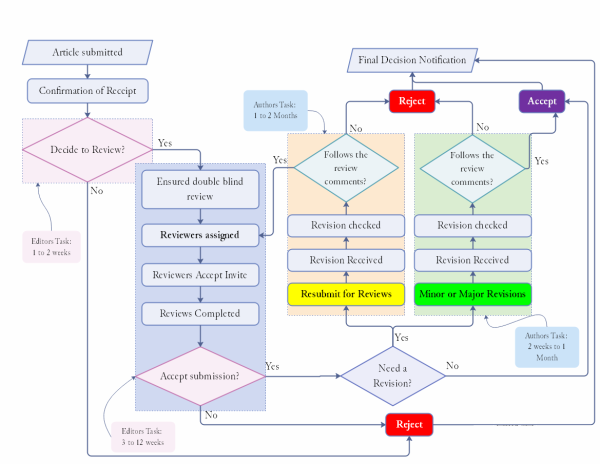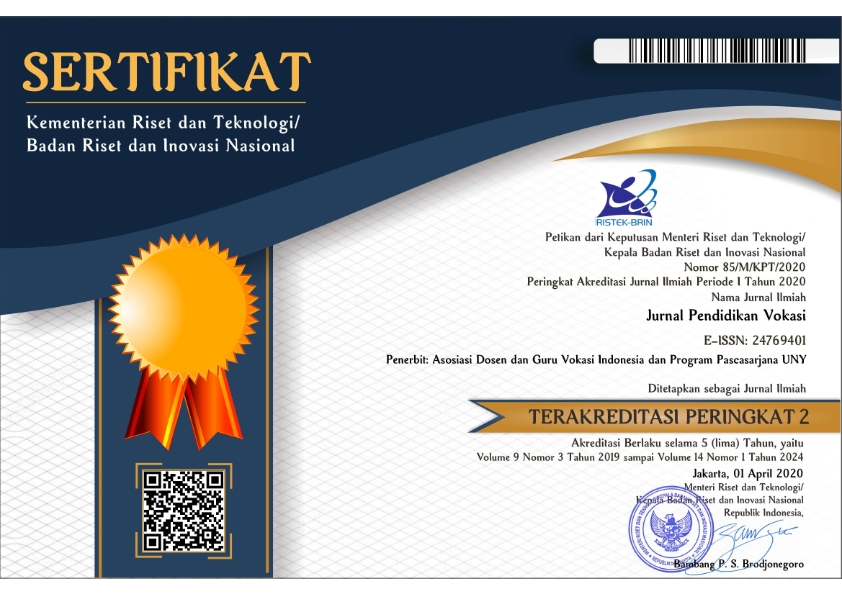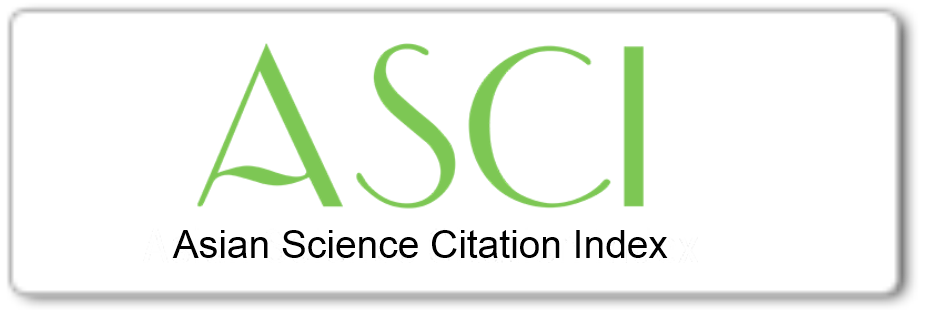- Focus and Scope
- Section Policies
- Peer Review Process
- Publication Frequency
- Open Access Policy
- Archiving
- Publiaction Ethics
- Purchase Hardprint
- Digital Archiving
- Withdrawal of Manuscripts
- Plagiarsm Policy
Focus and Scope
The scope of Jurnal Pendidikan Vokasi includes philosophy, curriculum, learning, evaluation, management, techonlogy, and policies on vocational education. In addition, studies on the global scope related to technology development research in the industry, technical and vocational education and training areas that become the object of the study can also be published in this journal.
Section Policies
Articles
Editorial
Peer Review Process
- Editors first review the submitted manuscript, called initial review by the editors. It will be desk evaluated whether the submitted manuscript is suitable for the Jurnal Pendidikan Vokasi based on focus and scope, similarity score by using Anti-Plagiarism Software, methodological flaw, readability of the articles, and adhering to the submitted paper template.
- Furthermore, the manuscript will be sent to at least two anonymous reviewers (Double-Blind Peer-Review).
- The anonymous reviewers' comments are then sent to the corresponding author for necessary actions and responses. Afterward, the editorial team meeting suggested the final decision to the revised manuscript by authors.
- Finally, the Editor will send the final decision to the corresponding author.
- The accepted manuscript then continued to the copyediting and layout editing process to prepare the camera-ready paper.

Publication Frequency
Jurnal Pendidikan Vokasi publishes three issues a year in February, June and November disseminating the result of scientific studies and research
Open Access Policy
This journal provides immediate open access to its content on the principle that making research freely available to the public supports a greater global exchange of knowledge.
Archiving
This journal utilizes the LOCKSS system to create a distributed archiving system among participating libraries and permits those libraries to create permanent archives of the journal for purposes of preservation and restoration. More...
Publiaction Ethics
The publication ethics which all authors need to be aware of:
- The manuscript presents complete and original information as well as objective data.
- Quotation source and reference cited in the manuscript must be informed.
- The manuscript is written concisely and clearly for efficiency.
- The manuscript is, at the same time, not being sent to and has never been published in another journal.
- All persons who have a reasonable claim to authorship must be named in the manuscript as co-authors; the corresponding author must be authorized by all co-authors to act as an agent on their behalf in all matters pertaining to the publication of the manuscript, and the order of names should be agreed by all authors.
- Everyone involved in the research (students, supervisors, or colleagues) should be included as co- writers.
- A writer who already passed away should be included as a co-author.
- Authors must avoid fabrication (make up the data and results of a study).
- Authors must avoid falsification (manipulating research materials, equipment, processes, changing the data or intentionally discarding data or results).
- Authors should avoid Plagiarism (taking ideas, processes, results or words without citing the sources).
- Authors should avoid Fragmentation (breaking research data into different themes of manuscript so that the discussion cannot become in-depth)
- The manuscript should not use copied materials from another article without permission.
- All materials/quotation earned from previous research, involving similar writers related to previous publications must be cited properly.
- For all manuscripts non-discriminatory language is mandatory. Sexist or racist terms must not be used.
- When using a word which is or is asserted to be a proprietary term or trademark, authors must use the symbol ® or ™.
- Authors may embed equations or image files within their manuscript as long as it is original and easily managed.
The publication ethics which all editors need to be aware of:
- An editor at any time evaluates manuscripts for their intellectual content without regard to race, gender, sexual orientation, religious belief, ethnic origin, citizenship, or political philosophy of the authors.
- The editor and any editorial staff must not disclose any information about a submitted manuscript to anyone other than the corresponding author, reviewers, potential reviewers, other editorial advisers, and the publisher, as appropriate.
- Unpublished materials disclosed in a submitted manuscript must not be used in an editor's own research without the express written consent of the author.
- The editorial board of the journal is responsible for deciding which of the articles submitted to the journal should be published. The validation of the work in question and its importance to researchers and readers must always drive such decisions. The editors may be guided by the policies of the journal's editorial board and constrained by such legal requirements as shall then be in force regarding libel, copyright infringement and plagiarism. The editors may confer with other editors or reviewers in making this decision.
- The editor must ensure that each manuscript is initially evaluated by the editor for originality. The editor should organize and use peer review fairly and wisely. Editors should explain their peer review processes in the information for authors and also indicate which parts of the journal are peer-reviewed. The editor should use appropriate peer reviewers for papers that are considered for publication by selecting people with sufficient expertise and avoiding those with conflicts of interest.
The publication ethics which all reviewers need to be aware of:
- Peer review process assists the editor in making editorial decisions, and through the editorial communications with the author, reviewers may also assist the author in improving the paper.
- Any selected referee/reviewer who feels unqualified to review the research reported in a manuscript or knows that its prompt review will be impossible should notify the editor and excuse himself/herself from the review process
- Reviews should be conducted objectively. Personal criticism of the author is inappropriate. Reviewers should express their views clearly with supporting arguments.
- Any manuscripts received for review must be treated as confidential documents. They must not be shown to or discussed with others except as authorized by the editor.
- Privileged information or ideas obtained through peer review must be kept confidential and not used for personal advantage. Reviewers should not consider manuscripts in which they have conflicts of interest resulting from competitive, collaborative, or other relationships or connections with any of the authors, companies, or institutions connected to the papers.
- Reviewers should identify relevant published work that has not been cited by the authors. Any statement that an observation, derivation, or argument had been previously reported should be accompanied by the relevant citation. A reviewer should also call to the editor's attention any substantial similarity or overlap between the manuscript under consideration and any other published paper of which they have personal knowledge.
Purchase Hardprint
Jurnal Pendidikan Vokasi can be purchased by:
| 50.000 (IDR) |
BANK TRANSFER
- Send the payment receipt to email jpvokasi@uny.ac.id after transfer to:
Bank : Bank Negara Indonesia Branch : BNI UGM Yogyakarta Name : Ririn Susetyaningsih No : 0468970056 Address : Jln. Persatuan Bulak Sumur No 1 Swift Code : BNINIDJAXXX
The journal will be sent immediately after we receive the subscription form and payment receipt.
Send to email: jpvokasi@uny.ac.id
CASH
Those who want to make payment by cash may visit Journal Manager office on the second floor of the General Lecture Building of the Graduate School of Universitas Negeri Yogyakarta, Yogyakarta 55281 Phone +62274-550836 Fax +62274-520326
JOURNAL AVAILABILITY
- Volume 7, No 1, February 2017
- Volume 7, No 2, June 2017
- Volume 7, No 3, November 2017
- Volume 8, No 1, February 2018
- Volume 8, No 2, June 2018
- Volume 8, No 3, November 2018
- Volume 9, No 1, February 2019
- Volume 9, No. 2, June 2019
Digital Archiving
This journal utilizes the Indonesian Publication Index (IPI) system to create a distributed archiving system among participating libraries and permits those libraries to create permanent archives of the journal for purposes of preservation and restoration.
Withdrawal of Manuscripts
Author is not allowed to withdraw submitted manuscripts, because the withdrawal is a waste of valuable resources that editors and referees spent a great deal of time processing submitted manuscript, and works invested by the publisher.
If author still requests withdrawal of his/her manuscript when the manuscript is still in the peer-reviewing process, author will be punished with paying IDR 500.000,- per manuscript, as a withdrawal penalty to the publisher. However, it is unethical to withdraw a submitted manuscript from one journal if accepted by another journal.
The withdrawal of manuscript after the manuscript is accepted for publication, author will be punished by paying IDR 1.000.000,- per manuscript. Withdrawal of manuscript is only allowed after withdrawal penalty has been fully paid to the Publisher. If author doesn't agree to pay the penalty, the author and his/her affiliation will be blacklisted for publication in this journal. Even, his/her previously published articles will be removed from our online system.
Author is not allowed to withdraw submitted manuscripts, because the withdrawal is a waste of valuable resources that editors and referees spent a great deal of time processing submitted manuscript, and works invested by the publisher.
If author still requests withdrawal of his/her manuscript when the manuscript is still in the peer-reviewing process, author will be punished with paying Rp500.000,- per manuscript, as a withdrawal penalty to the publisher. However, it is unethical to withdraw a submitted manuscript from one journal if accepted by another journal.
The withdrawal of manuscript after the manuscript is accepted for publication, author will be punished by paying IDR 1.000.000,- per manuscript. Withdrawal of manuscript is only allowed after withdrawal penalty has been fully paid to the Publisher. If author doesn't agree to pay the penalty, the author and his/her affiliation will be blacklisted for publication in this journal. Even, his/her previously published articles will be removed from our online system.
Plagiarsm Policy
Plagiarism includes but is not limited to:
- Refer and/or quoting terms, words and/or sentences, data and/or information from a source without citing sources in the record citation and/or without stating the source adequately;
- Refer and/or quoting random terms, words and/or sentences, data and/or information from a source without citing a source in the record citation and/or without stating the source adequately;
- Using a source of ideas, opinions, views, or theory without stating the source adequately;
- Formulate the words and/or sentences themselves from the source of words and/or phrases, ideas, opinions, views, or theory without stating the source adequately;
- Submit scientific papers produced and/or published by others as a source of scientific work without expressing adequately.
Prevention
Jurnal Pendidikan Vokasi will ensure that every published article will not exceed a 20% similarity score. Plagiarism screening will be conducted by Jurnal Pendidikan Vokasi using Turnitin and Plagiarism Checker X
Sanctions
- Reprimand;
- Letter of warning;
- Revocation of the article;
- Cancellation of publication.















